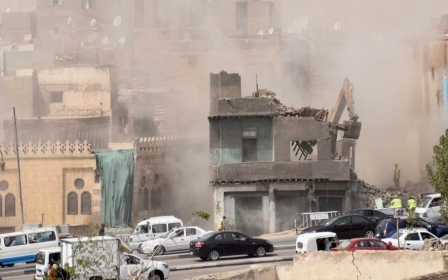Egyptian ex-antiquities minister's Unesco nomination marred by demolitions

A former Egyptian minister from President Abdel Fattah el-Sisi’s government has been confirmed as a candidate for the next director general of Unesco, a decision overshadowed by recent demolitions in Cairo’s City of the Dead.
A spokesperson for the Ministry of Foreign Affairs of Egypt, Ahmed Abu Zeid, wrote on X (formerly known as Twitter) on Wednesday that Egypt’s former minister of tourism and antiquities, Khaled al-Anani, had been approved by the Council of Arab Foreign Ministers as a candidate for the position.
“The Council of Arab Foreign Ministers approves the candidacy of Dr Khaled al-Anani as an Arab candidate for the position of Director General of Unesco for the period 2025-2029, as part of endorsing Arab nominations for a number of international positions,” Abu Zeid wrote.
Unesco, or the United Nations Educational, Scientific and Cultural Organization, is the UN agency that oversees the “identification, protection and preservation of cultural and natural heritage around the world considered to be of outstanding value to humanity”, according to its website.
Among the locations listed as Unesco World Heritage sites is Cairo’s City of the Dead, a necropolis which contains mausoleums of prominent historic rulers, singers, poets, royal family members and Islamic scholars, as well as artefacts from the Mamluk era.
Stay informed with MEE's newsletters
Sign up to get the latest alerts, insights and analysis, starting with Turkey Unpacked
The announcement was met with criticism after bulldozers resumed the destruction of mausoleums that some Egyptian academics and architects consider to be a significant part of Egypt’s Islamic and modern heritage which combines Mamluk, Ottoman, and European architecture.
Thousands of graves have already been destroyed in demolitions under plans to build new highways to connect Cairo to its new administrative capital, forcing families to exhume remains and relocate them to alternative graves in the desert.
Reckless policies
“Backing an ex-minister to run for Unesco director general will probably take the discussion around the government's reckless policies to the international arena,” said Ahmed Aboudouh, associate fellow at Chatham House and non-resident fellow with the Atlantic Council.
Khaled Fahmy, a professor in history at Tufts University, wrote on X on Wednesday “Shame on you” in response to Abu Zeid’s post. “This at the time when [the] Egyptian government is busy bulldozing Cairo's Islamic cemetery.”
“Let me add that when he was Minister of Antiquities, he removed monuments from listing and refused to list any new site or building,” Omniya Abdel Barr, a conservation architect and Islamic art historian wrote on X on Thursday.
In a statement, Unesco said that the World Heritage Committee – the governing body of the Convention composed of 21 member states – had already expressed concerns about the demolitions in 2021, and requested the Egyptian government to submit more information about any new construction work.
Even as Egypt struggles with soaring inflation and the devaluation of the Egyptian pound, Sisi has spent tens of billions of dollars on the country’s glistening new administrative capital where government ministries are being relocated to.
Plans to build new highways and flyovers - many of which now erupt from sections of the historic City of the Dead - would allow more affluent Egyptians to travel from old Cairo to the new administrative capital.
Amid worsening water shortages exacerbated further by population growth and poor water management according to experts, the megacity will also include an artificial river running through a site in the middle of a desert with no natural sources of water nearby.
MEE has contacted Unesco for comment on the Council of Arab Foreign Ministers' decision to appoint Anani as a candidate for director general.
Mada Masr, an independent Egyptian news publication, reported that the demolitions stopped on Sunday, although there was a ban on photography in the area amid an intense security presence.
But Aboudouh added that, as the dust settles on the most recent spate of demolitions, “the Egyptian nominee will have a lot of questions to answer. This may even cost him the race.”
Middle East Eye delivers independent and unrivalled coverage and analysis of the Middle East, North Africa and beyond. To learn more about republishing this content and the associated fees, please fill out this form. More about MEE can be found here.





